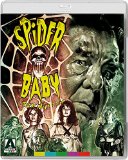| Reviews & Columns |
|
Reviews DVD TV on DVD Blu-ray 4K UHD International DVDs In Theaters Reviews by Studio Video Games Features Collector Series DVDs Easter Egg Database Interviews DVD Talk Radio Feature Articles Columns Anime Talk DVD Savant Horror DVDs The M.O.D. Squad Art House HD Talk Silent DVD
|
DVD Talk Forum |
|
|
| Resources |
|
DVD Price Search Customer Service #'s RCE Info Links |
|
Columns
|
|
|
Spider Baby
Arrow Features // Unrated // June 9, 2015
List Price: $39.95 [Buy now and save at Amazon]
The Film:
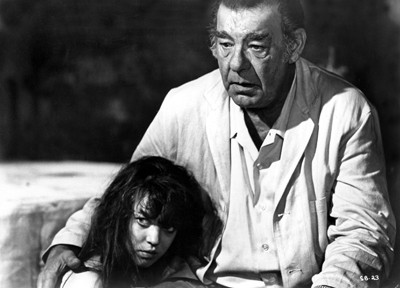 Successful horror comedies tend to be a mixture of the best of both worlds, making the audience laugh and get freaked out in satisfying, relatively even intervals. There's a black-comedy mood that exists between the two, though, that frequently goes overlooked in those hybrid productions: that unsettling feeling where someone's unsure of whether to snicker or to squirm, a complicated balance to strike without tilting too far in one direction or the other. The Merrye house in Jack Hill's Spider Baby seems as if it was built out of materials designed specifically for that middle-ground in mind, setting the stage for a cleverly disturbing piece of '60s filmmaking that uses cannibalism, inbreeding, and mental disorder to just the right ends. Creepy without being too grotesque and witty without ruining the eeriness of the atmosphere, Hill constructed a gem of a horror picture out of a straightforward concept that withstands the test of time due to its macabre equilibrium.
Successful horror comedies tend to be a mixture of the best of both worlds, making the audience laugh and get freaked out in satisfying, relatively even intervals. There's a black-comedy mood that exists between the two, though, that frequently goes overlooked in those hybrid productions: that unsettling feeling where someone's unsure of whether to snicker or to squirm, a complicated balance to strike without tilting too far in one direction or the other. The Merrye house in Jack Hill's Spider Baby seems as if it was built out of materials designed specifically for that middle-ground in mind, setting the stage for a cleverly disturbing piece of '60s filmmaking that uses cannibalism, inbreeding, and mental disorder to just the right ends. Creepy without being too grotesque and witty without ruining the eeriness of the atmosphere, Hill constructed a gem of a horror picture out of a straightforward concept that withstands the test of time due to its macabre equilibrium.
It's hard to overlook the similarities between Spider Baby and The Addams Family, where a ghoulish family largely separated from society goes about their everyday activities as if their warped sensibilities are the norm. The oddness of the Merrye family goes beyond the way they conduct themselves, though, since they're the outcome of a deep history of family breeding within itself, resulting in a degenerative disorder that causes its members to regress into a infantile, cannibalistic state with age. After the death of the father, the family's manservant and connection to the outside world, Bruno (Lon Chaney Jr.), took on the responsibility of caring for the three remaining children and keeping the family a secret in their large dilapidated house: twisted sisters Elizabeth (Beverly Washburn) and Virginia (Jill Banner), the youngest fancying herself a human spider, and their brother, Ralph (Sid Haig), who's in an advanced stage of the "syndrome". Their way of doing things gets interrupted by distant relatives and their lawyer, arriving to seize the estate's assets after evaluating the situation overnight.
The key difference between Jack Hill's film and the popular television show to which it's so naturally compared lies the relationship among the Merryes, which isn't made of the same perverted flip on the nuclear family and conforming to social conventions. These folks are truly demented and barely held together by the nervous yet complicit Bruno, shrewdly played by Lon Chaney Jr. with a booming, reassuring appeal as he deals with the challenges of keeping the house from falling apart. Spider Baby doesn't take very long in revealing the reasons why their secrets are worth keeping, either, as Virginia shows how she enjoys "playing spider" with a pair of fang-esque kitchen knives upon a random delivery man in the film's first scene. Therefore, when strangers come knocking and sticking their noses in the Merryes' affairs, there's a sense of dread atop the morbid curiosity in seeing how they'll respond to outsiders, though Hill's script certainly doesn't shy away from opportunities at grotesque humor, either.
With cinematographer Alfred Taylor capturing the dim, dingy corners of the tattered household and the things that lurk underneath, Spider Baby settles into an spooky overnight situation where these "normal" people are thrust into the evening activities of the troubled Merryes, tapping into a vein of black comedy amid their acclimation. The outsiders are, admittedly, a tad broad: Emily's stiff disgust with the family and absorption with money tends to be all too predictable despite Carol Ohmart's charismatic efforts, as are the sleazy and skeptical antics of thin-mustached lawyer Mr. Schlocker (Karl Schanzer).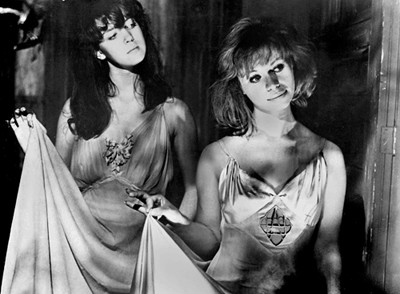 Director Hill uses that simplicity to concoct a sharp contrast between personalities, though, matching the urbanites beat-for-beat with the peculiarity of the siblings' table manners and other ... uh, routines. A brilliantly twisted dinner scene emerges as a result, where the oddities of the meager dishes served -- and how they got to the table -- are accentuated by Quinn Redecker's "Uncle Peter" and his acceptance of the skin-crawling situation.
Director Hill uses that simplicity to concoct a sharp contrast between personalities, though, matching the urbanites beat-for-beat with the peculiarity of the siblings' table manners and other ... uh, routines. A brilliantly twisted dinner scene emerges as a result, where the oddities of the meager dishes served -- and how they got to the table -- are accentuated by Quinn Redecker's "Uncle Peter" and his acceptance of the skin-crawling situation.
The rest of the evening turns into a cabaret of the bizarre as the siblings work their wonders on their visitors, transforming Spider Baby into a raucous experience with unforeseeable and delightfully morbid twists. Despite the questionable reasons why folks choose to stick around and leave the the Merrye household, Jack Hill creates a series of unsettling events that naturally unearth from what we've learned about the family members beforehand. While she's captivating from the start as she dual-wields her knives, the seductive, predatory scheming of Jill Banner's Virginia becomes even more of a force to be reckoned with in the presence of their guests, producing an entrancing bit of eroticism as she "dances" for her latest prey ensnared in her web. Turns out, her performance is only the tip of the iceberg in deciphering the weirdness behind the walls and under the floorboards of the Merrye house, leaving one feeling mightily sorry for old Bruno's call to duty once all's said and done in this deranged little fable.
The Blu-ray:
Ah, it's delightful to see work like this put into the aesthetics of a home-video package, quickly becoming a rarity these days outside of boutique labels. Carrying over the packaging design from their UK release, Arrow Video have presented Jack Hill's Spider Baby in an incredibly attractive, "director approved" two-disc set: Disc One being the Blu-ray, and Disc Two being the standard-definition DVD. Reversible artwork features both an original design and a reworked version of poster artwork from the time of the film's release, slid within a clear, wide swinging-tray case. A slick Booklet has also been included that, along with information about the transfer, contains a pair of great textual pieces: "Just Because Something Isn't Good Doesn't Mean It's Bad: Or, Loving the Maddest Story Ever Told" by Steven R. Bissette, and "Voices from the House on Spider Baby Hill", an interview series with the cast and crew by Paul Parla and and Charles P. Mitchell.
Video and Audio:
Arrow Video had previously sent over a screener/check disc of Spider Baby's Blu-ray presentation, and the assumption that the largely spectacular 1.66:1-framed, 1080p AVC transfer contained within would reflect the final product of the label's restoration effort turned out to be correct. The fifty-year-old, black-and-white cinematography for this mostly obscure horror film -- which has seen its fair share of distribution issues -- looks spectacular. Grain structure is rich and hefty, yet allows tons of fine details to emerge from underneath, though there are a few noticeable blips and lines throughout. Patterns on fabric, cobwebs, sudsy water on hardwood floors, a flickering lamp, even telephone wires at a distance during exterior sequences stand out from the image. The metallic shine on vehicles and serving dishes appear quite natural, while the tarnish on a glass lantern and the folds of fabric showcase the transfer's delightful grasp on contrast underneath shadows, inky and strong but aware of mild gradation and details within. Clarity varies between shots and turns slightly hazy at points, either for artistic effect or by the limitations of the print, but overall Spider Baby looks really fantastic.
The sound treatment for Spider Baby's PCM Mono track stands relatively strong alongside the impressive quality of the visual transfer considering its vintage, a satisfying and natural sonic treatment with a handful of easily passable, age-bound flaws throughout. Sound effects like the howling of a wolf, the croaking of frogs, and the squawking of an owl are notably strong and natural, while smaller effects like rats squeaking and creaky floorboards underneath the soft shuffling of feet are distinct and convincing. There's no getting around the vintage of the music, but there are a lot of delicate musical elements which sneak up from the score's design that possess a lot of mid-range clarity and balanced intensity. Dialogue also wears its age, too, but it's always discernible and commands an authentic range. There are a few stray moments of hiss and pop throughout, but they're infrequent in comparison to the moments that handle the film's still, eerie temperament.
Special Features:
Many of Arrow Video's supplements have been carried over from Dark Sky's previous DVD presentation from 2007, including an insightful and enjoyable Audio Commentary with Jack Hill and Sid Haig. The pair take on a conversational rhythm as they dig into their memories involving the scenes, the locations, and the actors, coming up with some great nuggets of info -- about Jill Banner's participation in the film, about the challenges of lighting with limited resources, and Hill's in-jokes written into the script -- as they keep up their momentum pretty much throughout. The Hatching of Spider Baby (31:43, 16x9) collects interviews with Jack Hill, Sid Haig, Quinn Redecker, Beverly Washburn, and other cast/crew as they tell the story of the film's conception and legacy. Spider Stravinsky (10:58, 16x9) covers composer Ronald Stein's prior history with Roger Corman and his on-the-cheap creation of Spider Baby's score and the Lon Chaney Jr.-driven title song, while The Merrye House Revisited (7:38, 16x9) finds Jack Hill traveling to the still-standing house in Highland Park.
Arrow's Blu-ray also includes a lengthy Panel Discussion (33:08, 16x9), which starts with about ten minutes of lead-in about the Academy restoration and introductions before getting into a charming discussion about the film with Jack Hill, Quinn Redecker, and Beverly Washburn. They've also carried over Jack Hill's student short film, The Host (29:49, 16x9), a western featuring the premiere of actor Sid Haig, as well as an Alternate Opening Title Sequence for "Cannibal Orgy" (1:50, 16x9), an Extended Scene (4:04, 16x9) involving the introduction of the normal folks to the Merryes, a Gallery and a Theatrical Trailer (1:08, 16x9) with some rather nutty voiceover work.
Final Thoughts:
Jack Hill's Spider Baby didn't get a fair shake during the time of its release in the late-'60s, but it's found a creepy cult-status place on home-video, and rightfully so. Stylish black-and-white photography captures the antics of the out-there Merrye family and their regressive "syndrome", which leads into a chaotic, unsettling evening with distant relatives in pursuit of their inheritance. Extreme gore and madcap humor aren't what Hill's after, though, instead riding this sinister black-comedy attitude between the two, hallmarked by Lon Chaney's sympathetic presence as he attempts to keep the Merrye children under control. That, naturally, isn't an entirely successful endeavor, and watching how Jill "Spider Baby" Banner, Beverly Washburn, and Sid Haig play with their visitors makes for icky, schlocky entertainment. Arrow Video's Blu-ray looks terrific and sounds suitable, and comes with a bevy of extras well worth the time. Highly Recommended.
Thomas Spurlin, Staff Reviewer -- DVDTalk Reviews | Personal Blog/Site
 Successful horror comedies tend to be a mixture of the best of both worlds, making the audience laugh and get freaked out in satisfying, relatively even intervals. There's a black-comedy mood that exists between the two, though, that frequently goes overlooked in those hybrid productions: that unsettling feeling where someone's unsure of whether to snicker or to squirm, a complicated balance to strike without tilting too far in one direction or the other. The Merrye house in Jack Hill's Spider Baby seems as if it was built out of materials designed specifically for that middle-ground in mind, setting the stage for a cleverly disturbing piece of '60s filmmaking that uses cannibalism, inbreeding, and mental disorder to just the right ends. Creepy without being too grotesque and witty without ruining the eeriness of the atmosphere, Hill constructed a gem of a horror picture out of a straightforward concept that withstands the test of time due to its macabre equilibrium.
Successful horror comedies tend to be a mixture of the best of both worlds, making the audience laugh and get freaked out in satisfying, relatively even intervals. There's a black-comedy mood that exists between the two, though, that frequently goes overlooked in those hybrid productions: that unsettling feeling where someone's unsure of whether to snicker or to squirm, a complicated balance to strike without tilting too far in one direction or the other. The Merrye house in Jack Hill's Spider Baby seems as if it was built out of materials designed specifically for that middle-ground in mind, setting the stage for a cleverly disturbing piece of '60s filmmaking that uses cannibalism, inbreeding, and mental disorder to just the right ends. Creepy without being too grotesque and witty without ruining the eeriness of the atmosphere, Hill constructed a gem of a horror picture out of a straightforward concept that withstands the test of time due to its macabre equilibrium. It's hard to overlook the similarities between Spider Baby and The Addams Family, where a ghoulish family largely separated from society goes about their everyday activities as if their warped sensibilities are the norm. The oddness of the Merrye family goes beyond the way they conduct themselves, though, since they're the outcome of a deep history of family breeding within itself, resulting in a degenerative disorder that causes its members to regress into a infantile, cannibalistic state with age. After the death of the father, the family's manservant and connection to the outside world, Bruno (Lon Chaney Jr.), took on the responsibility of caring for the three remaining children and keeping the family a secret in their large dilapidated house: twisted sisters Elizabeth (Beverly Washburn) and Virginia (Jill Banner), the youngest fancying herself a human spider, and their brother, Ralph (Sid Haig), who's in an advanced stage of the "syndrome". Their way of doing things gets interrupted by distant relatives and their lawyer, arriving to seize the estate's assets after evaluating the situation overnight.
The key difference between Jack Hill's film and the popular television show to which it's so naturally compared lies the relationship among the Merryes, which isn't made of the same perverted flip on the nuclear family and conforming to social conventions. These folks are truly demented and barely held together by the nervous yet complicit Bruno, shrewdly played by Lon Chaney Jr. with a booming, reassuring appeal as he deals with the challenges of keeping the house from falling apart. Spider Baby doesn't take very long in revealing the reasons why their secrets are worth keeping, either, as Virginia shows how she enjoys "playing spider" with a pair of fang-esque kitchen knives upon a random delivery man in the film's first scene. Therefore, when strangers come knocking and sticking their noses in the Merryes' affairs, there's a sense of dread atop the morbid curiosity in seeing how they'll respond to outsiders, though Hill's script certainly doesn't shy away from opportunities at grotesque humor, either.
With cinematographer Alfred Taylor capturing the dim, dingy corners of the tattered household and the things that lurk underneath, Spider Baby settles into an spooky overnight situation where these "normal" people are thrust into the evening activities of the troubled Merryes, tapping into a vein of black comedy amid their acclimation. The outsiders are, admittedly, a tad broad: Emily's stiff disgust with the family and absorption with money tends to be all too predictable despite Carol Ohmart's charismatic efforts, as are the sleazy and skeptical antics of thin-mustached lawyer Mr. Schlocker (Karl Schanzer).
 Director Hill uses that simplicity to concoct a sharp contrast between personalities, though, matching the urbanites beat-for-beat with the peculiarity of the siblings' table manners and other ... uh, routines. A brilliantly twisted dinner scene emerges as a result, where the oddities of the meager dishes served -- and how they got to the table -- are accentuated by Quinn Redecker's "Uncle Peter" and his acceptance of the skin-crawling situation.
Director Hill uses that simplicity to concoct a sharp contrast between personalities, though, matching the urbanites beat-for-beat with the peculiarity of the siblings' table manners and other ... uh, routines. A brilliantly twisted dinner scene emerges as a result, where the oddities of the meager dishes served -- and how they got to the table -- are accentuated by Quinn Redecker's "Uncle Peter" and his acceptance of the skin-crawling situation. The rest of the evening turns into a cabaret of the bizarre as the siblings work their wonders on their visitors, transforming Spider Baby into a raucous experience with unforeseeable and delightfully morbid twists. Despite the questionable reasons why folks choose to stick around and leave the the Merrye household, Jack Hill creates a series of unsettling events that naturally unearth from what we've learned about the family members beforehand. While she's captivating from the start as she dual-wields her knives, the seductive, predatory scheming of Jill Banner's Virginia becomes even more of a force to be reckoned with in the presence of their guests, producing an entrancing bit of eroticism as she "dances" for her latest prey ensnared in her web. Turns out, her performance is only the tip of the iceberg in deciphering the weirdness behind the walls and under the floorboards of the Merrye house, leaving one feeling mightily sorry for old Bruno's call to duty once all's said and done in this deranged little fable.
The Blu-ray:
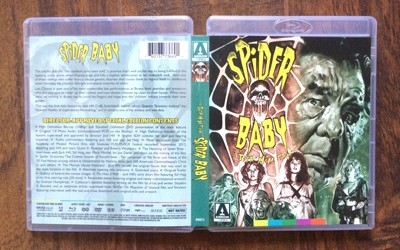 | 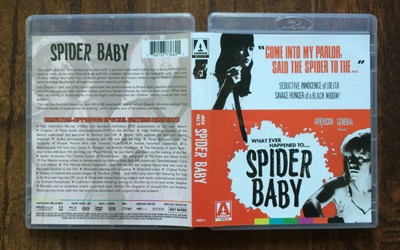 |
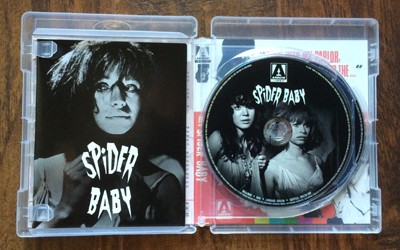 | 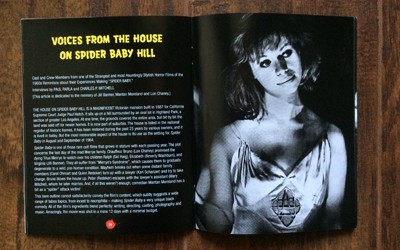 |
 | |
Ah, it's delightful to see work like this put into the aesthetics of a home-video package, quickly becoming a rarity these days outside of boutique labels. Carrying over the packaging design from their UK release, Arrow Video have presented Jack Hill's Spider Baby in an incredibly attractive, "director approved" two-disc set: Disc One being the Blu-ray, and Disc Two being the standard-definition DVD. Reversible artwork features both an original design and a reworked version of poster artwork from the time of the film's release, slid within a clear, wide swinging-tray case. A slick Booklet has also been included that, along with information about the transfer, contains a pair of great textual pieces: "Just Because Something Isn't Good Doesn't Mean It's Bad: Or, Loving the Maddest Story Ever Told" by Steven R. Bissette, and "Voices from the House on Spider Baby Hill", an interview series with the cast and crew by Paul Parla and and Charles P. Mitchell.
Video and Audio:
Arrow Video had previously sent over a screener/check disc of Spider Baby's Blu-ray presentation, and the assumption that the largely spectacular 1.66:1-framed, 1080p AVC transfer contained within would reflect the final product of the label's restoration effort turned out to be correct. The fifty-year-old, black-and-white cinematography for this mostly obscure horror film -- which has seen its fair share of distribution issues -- looks spectacular. Grain structure is rich and hefty, yet allows tons of fine details to emerge from underneath, though there are a few noticeable blips and lines throughout. Patterns on fabric, cobwebs, sudsy water on hardwood floors, a flickering lamp, even telephone wires at a distance during exterior sequences stand out from the image. The metallic shine on vehicles and serving dishes appear quite natural, while the tarnish on a glass lantern and the folds of fabric showcase the transfer's delightful grasp on contrast underneath shadows, inky and strong but aware of mild gradation and details within. Clarity varies between shots and turns slightly hazy at points, either for artistic effect or by the limitations of the print, but overall Spider Baby looks really fantastic.
The sound treatment for Spider Baby's PCM Mono track stands relatively strong alongside the impressive quality of the visual transfer considering its vintage, a satisfying and natural sonic treatment with a handful of easily passable, age-bound flaws throughout. Sound effects like the howling of a wolf, the croaking of frogs, and the squawking of an owl are notably strong and natural, while smaller effects like rats squeaking and creaky floorboards underneath the soft shuffling of feet are distinct and convincing. There's no getting around the vintage of the music, but there are a lot of delicate musical elements which sneak up from the score's design that possess a lot of mid-range clarity and balanced intensity. Dialogue also wears its age, too, but it's always discernible and commands an authentic range. There are a few stray moments of hiss and pop throughout, but they're infrequent in comparison to the moments that handle the film's still, eerie temperament.
Special Features:
Many of Arrow Video's supplements have been carried over from Dark Sky's previous DVD presentation from 2007, including an insightful and enjoyable Audio Commentary with Jack Hill and Sid Haig. The pair take on a conversational rhythm as they dig into their memories involving the scenes, the locations, and the actors, coming up with some great nuggets of info -- about Jill Banner's participation in the film, about the challenges of lighting with limited resources, and Hill's in-jokes written into the script -- as they keep up their momentum pretty much throughout. The Hatching of Spider Baby (31:43, 16x9) collects interviews with Jack Hill, Sid Haig, Quinn Redecker, Beverly Washburn, and other cast/crew as they tell the story of the film's conception and legacy. Spider Stravinsky (10:58, 16x9) covers composer Ronald Stein's prior history with Roger Corman and his on-the-cheap creation of Spider Baby's score and the Lon Chaney Jr.-driven title song, while The Merrye House Revisited (7:38, 16x9) finds Jack Hill traveling to the still-standing house in Highland Park.
Arrow's Blu-ray also includes a lengthy Panel Discussion (33:08, 16x9), which starts with about ten minutes of lead-in about the Academy restoration and introductions before getting into a charming discussion about the film with Jack Hill, Quinn Redecker, and Beverly Washburn. They've also carried over Jack Hill's student short film, The Host (29:49, 16x9), a western featuring the premiere of actor Sid Haig, as well as an Alternate Opening Title Sequence for "Cannibal Orgy" (1:50, 16x9), an Extended Scene (4:04, 16x9) involving the introduction of the normal folks to the Merryes, a Gallery and a Theatrical Trailer (1:08, 16x9) with some rather nutty voiceover work.
Final Thoughts:
Jack Hill's Spider Baby didn't get a fair shake during the time of its release in the late-'60s, but it's found a creepy cult-status place on home-video, and rightfully so. Stylish black-and-white photography captures the antics of the out-there Merrye family and their regressive "syndrome", which leads into a chaotic, unsettling evening with distant relatives in pursuit of their inheritance. Extreme gore and madcap humor aren't what Hill's after, though, instead riding this sinister black-comedy attitude between the two, hallmarked by Lon Chaney's sympathetic presence as he attempts to keep the Merrye children under control. That, naturally, isn't an entirely successful endeavor, and watching how Jill "Spider Baby" Banner, Beverly Washburn, and Sid Haig play with their visitors makes for icky, schlocky entertainment. Arrow Video's Blu-ray looks terrific and sounds suitable, and comes with a bevy of extras well worth the time. Highly Recommended.
|
| Popular Reviews |
| Sponsored Links |
|
|
| Sponsored Links |
|
|
| Release List | Reviews | Shop | Newsletter | Forum | DVD Giveaways | Blu-Ray | Advertise |
|
Copyright 2024 DVDTalk.com All Rights Reserved. Legal Info, Privacy Policy, Terms of Use,
Manage Preferences,
Your Privacy Choices | |||||||









